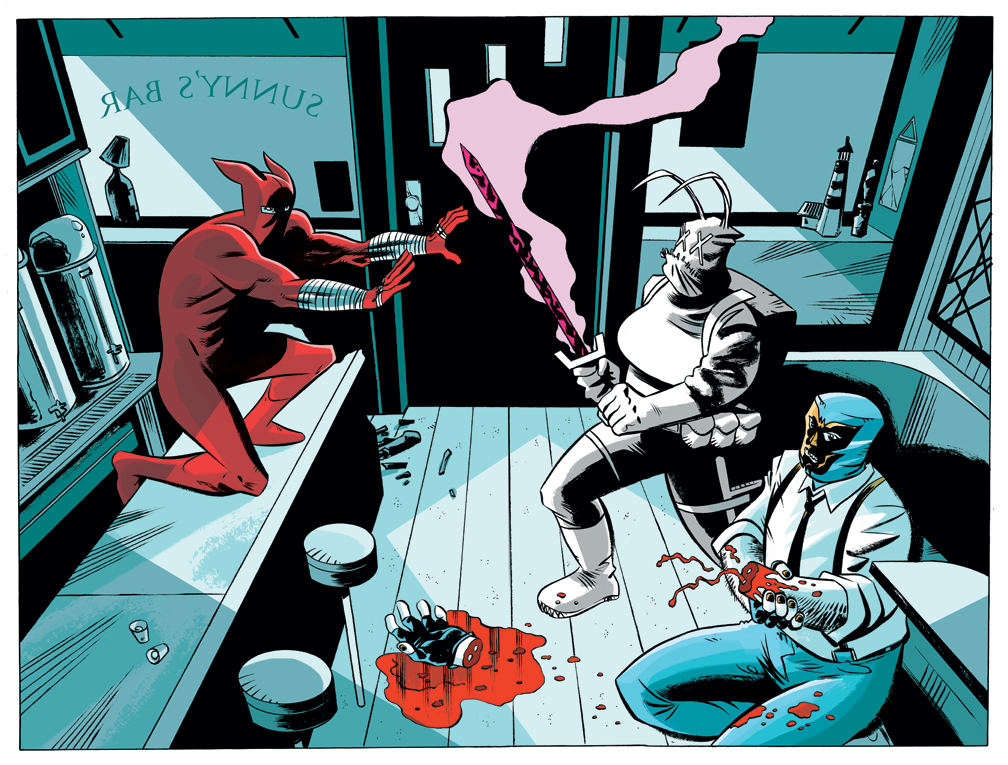You’ve been working on your comic for what probably seems like forever and finally, you feel that you are ready to share it with the world. Of course, you can always go the route of self-publishing, but that carries with it a number of obligations and expectations — printing, shipping, marketing — that you may not have the desire or the knowledge to take on. Thankfully, there are a number of amazing small press comics publishers who are constantly looking to expand their catalog and bring new voices into the world.
Unfortunately, though, as much as there are ethical publishers who want what’s best for the artists they publish, there are also bad actors who prey on the talents of young and new creators.
Part of the goal of Fieldmouse Press, the nonprofit press that publishes SOLRAD, is to advance the comics arts. We see the continued social and economic success of cartoonists as integral to that goal. SOLRAD has devoted and will continue to devote resources to this area of focus.To this end, we are running an ongoing feature at SOLRAD called KNOWING IS HALF THE BATTLE where we both feature an artist every week and ask for their advice about navigating the world of comics publishing, best practices for the business of comics, and other general advice. Today on KNOWING IS HALF THE BATTLE we’re featuring tips from DEAN HASPIEL.

Emmy award winner and Eisner, Harvey, and Ignatz Award nominee Dean Haspiel created BILLY DOGMA, illustrated for HBO’s Bored To Death, was a Master Artist at the Atlantic Center for the Arts, is a Yaddo fellow, a playwright, helped pioneer personal webcomics with the invention of ACT-I-VATE.com and TripCity.net, and is the co-founder of Hang Dai Editions in Brooklyn, NY. Dino has written and drawn many comic books, including The Fox, Spider-Man, Batman, X-men, The Fantastic Four, Wonder Woman, Deadpool, Godzilla, Mars Attacks, Garbage Pail Kids, Creepy, and collaborations with Harvey Pekar, Jonathan Ames, Inverna Lockpez, Jonathan Lethem, Mark Waid, and Stan Lee. Dino steeps in psychotronic movies, cosmic electronica, and Jack Kirby pulp.
His current project is BLACKOUT, The Red Hook season 4 (at Webtoon): “The Red Hook must combat his vigilante mother to destroy an Apocalypse Sword, only to rebirth the wrath of a villain who threatens to send New Brooklyn back to the stone age!”
You can find out more about Dean by visiting his Website, following him on Twitter or Instagram.




Dean Haspiel
The main thing(s) I expect from a comics publisher is/are…
I expect a publisher to do what a creator can’t and/or shouldn’t have to do. I’d like a publisher to offer editorial insight, a livable advance, and a respectable deal. Help manage a reasonable workflow and keep timely communication. Provide great distribution and even better marketing. Why make something nobody knows about or can’t find? I need my publisher to invest in my idea as much as I do even if they don’t own any of the intellectual property. Besides artistic expression, the business of comics is to make money, right? Otherwise, there are many ways for a creator to get eyes on their work and money in their pocket on their own terms.
My #1 advice for submitting to agents and publishers…
I’ve never hired an agent so I can’t advise. I’ve heard legend of some good ones, but, according to colleagues, most agents are lazy and lousy. Be careful.
If you’re pitching cold to a publisher, make it easy yet interesting as possible. Understand your concept inside and out but leave wiggle room for a smart publisher and editor to respond proactively. Provide a compelling title, synopsis, main character descriptions, cool art, and an illustrated scene that helps set the visual tone. And know what the publisher likes. Don’t try to sell a steak to a vegan. But, jelly makes a peanut butter sandwich so much sweeter.
A sneaky red flag or shady thing I would warn new creators to look out for…
Run away from NDA’s (Non-Disclosure Agreements) unless it’s Coca-Cola, Disney, or some giant, well-known conglomerate who will PAY you really well to zip your lips. Otherwise, how the hell does a stranger know what ideas you’re developing? They could be very similar and suddenly you’re in a legal battle over Captain Ginormous! ALSO, work with a publisher who’s had at least 5-years of publishing experience. It should’ve given them enough time to make their rookie mistakes and manifest a strong strategy that works.
I think it can be worth it to take a lower-paid illustration job in return for ___…
Exposure? Nah. You can always take a lunch break in the sun if you want exposure. The only reason I might discount my rate is if I was getting work in bulk or I was trading it for something like a root canal at the dentist or an operation for my cat at The Vet. Decide what your rates are for friends, family, and business. Respect yourself before you wreck yourself.
If a publisher/offer seemed too good to be true, here’s how I’d check it out…
Ask other creators who have worked for said publisher if they’re on the level. Get the lay of the land. Usually, if something’s awry there’s already chatter about it online. But, don’t believe everything you see and read on the internet. Do your homework. Meanwhile, a contract is supposed to be binding. Keeps both parties culpable.
An organization I’d go to for support if I needed advice or if something went wrong…
I don’t have a lawyer or agent, but I’ve been a freelancer for 20+ years and I’m lucky enough to know smart people in the business. I tend to lean on them for legal questions, etc. Maybe you, too, know friendly people like that who fight the good fight. I know the CBLDF (Comic Book Legal Defense Fund) has been good for creators’ rights. And, The Hero Initiative helps cartoonists in need. In fact, they were the group I curated and co-edited a benefit anthology called PANDEMIX, Quarantine Comics in the Age of ‘Rona, for.
My best tip for promoting your work online and at cons…
A communication artist grows up in public, warts and all. Don’t be shy about what you do. Try to be witty and bold but don’t bully. Comfortably engage with your industry veterans, peers, and your readers. Develop healthy relations with movers and shakers but ignore the jerks. Know your community and show up to the party.
To take care of your health / mental health as an artist, I recommend…
Stand up. Stretch. Wave your arms. Move around. Rest your eyes and hands. Drink lots of water. Learn to cook food. Eat spicy food. Get cheap massages and go to the Russian-Turkish bathhouse if you don’t have a bathtub to steam in. Indulge in new things on a regular basis. Walk home a different way. Look up.
I wish someone had told me ___ before I started working in the comics industry…
There are so many things that recommend making comix. Starting with the low-budget aspect of creating worlds with a full pen and a blank piece of paper. No permissions. No apologies.
BUT…
Making comix can be extremely lonely. Sometimes hard to motivate. Almost impossible to be seen by strangers. Some people are okay with the process. Just making the comic is good enough. And, I applaud that exercise. But MY comic isn’t finished until YOU have read it.
I wish someone could have told 11-year old Dean that comic books would start to cost A LOT more than 35-cents and most newsstands and comic book shops would dissolve, only to be replaced by the realizations of Dick Tracy’s wristwatch radio and Star Trek’s communicator.
I wish someone had told me that working in the comics industry was the most unprofessional profession, and would basically become free digital content where most fans of the form will never read your stuff or know it even exists. That the coolest medium of all time would be forced to compete with cinematic sisters and blockbuster brothers. Don’t get me wrong, I love movies and TV but Margot Kidder’s Lois Lane said it best when Christopher Reeve’s Superman caught her falling in mid-air and he said, “I’ve got you.” And she said, “You’ve got me? Who’s got you!?”
Remember when “what happened?” was something you were interested in finding out on your own terms? Nowadays, narrative “content” is usurped by spoilers and click-bait aggregators fanning the infinity flames of social media outrage and “breaking news.”
Sure, reading teaches us that it’s one of the main characters who did it in a whodunit, but it’s the journey of getting there, as crafted by the sensibility of a unique author and/or creative team, that makes me a loyal fan.
So, if you so choose to dedicate your life to this, only YOU (and/or your team) can make YOUR comix. Meanwhile, live and learn, seek good advice, but don’t let anyone try to take that away from you. And, if you’re ever granted the privilege to be a custodian of an established property, please be respectful to its legacy. Don’t start drawing funny mustaches on all the characters just because you can.
SOLRAD is made possible by the generous donations of readers like you. Support our Patreon campaign, or make a tax-deductible donation to our publisher, Fieldmouse Press, today.

Leave a Reply